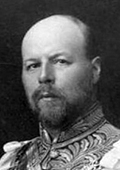 |
Hallam Tennyson
b. 11 Aug 1852, Twickenham, Middlesex, England
d. 2 Dec 1928, Freshwater, Isle of Wight, England |
| Title: |
Acting Governor-General and Commander-in-Chief of the Commonwealth of Australia |
| Term: |
17 Jul 1902 - 9 Jan 1903 |
| Chronology: |
10 Jul 1901, appointed by Commission under the Royal Sign Manual and Signet [1] |
| |
17 Jul 1902, took an oath of allegiance and an oath of office as Acting Governor-General and Commander-in-Chief of the Commonwealth of Australia, public ceremony, Federal Parliament House, Queen's Hall, Melbourne [2][3] |
| Title: |
Governor-General and Commander-in-Chief of the Commonwealth of Australia |
| Term: |
9 Jan 1903 - 21 Jan 1904 |
| Chronology: |
3 Dec 1902, appointed by Commission under the Royal Sign Manual and Signet [4] |
| |
9 Jan 1903, took an oath of allegiance and an oath of office as Governor-General and Commander-in-Chief of the Commonwealth of Australia, private ceremony, Government House, Melbourne [5][6] |
| |
21 Jan 1904, appointment superseded by the Commission of a successor effective on taking the prescribed oaths (21 Jan 1904) [7][8] |
| Names/titles: |
Nobility titles (succession): Baron Tennyson, of Aldworth, in the County of Sussex, and of Freshwater, in the Isle of Wight [from 6 Oct 1892] |
| Biography: |
| Eldest son of the poet laureate, Alfred Tennyson, Baron Tennyson, and his wife, Emily Sarah, née Sellwood; educated at home by his mother and a series of tutors; briefly attended a preparatory school at Bailey Gate in Dorset; attended Marlborough College (1866-1872); matriculated at Trinity College, Cambridge (1872); was admitted to the Inner Temple (1877); did not take up any profession and was closely involved in all his father's literary affairs, acting as secretary and confidant; summoned home to assist after his mother's breakdown in health in 1874; devoted himself to his family thereafter; became a councillor of the Imperial Federation League (1883); continued to act as his father's efficient private secretary until the latter's death in 1892; published his father's biography, Alfred Lord Tennyson: a Memoir by his Son (1897); served as a magistrate, and on the councils of Marlborough College and the Gordon Boys' Home; after his mother's death (1896), he actively sought selection for service in the empire; was appointed governor of South Australia (1899-1902); following the departure of Lord Hopetoun he became Acting Governor-General (17 Jul 1902 - 9 Jan 1903) and then Governor-General (9 Jan 1903 - 21 Jan 1904) of the Commonwealth of Australia; returned to England with his family in 1904, taking up residence at Farringford House, his family residence on the Isle of Wight; refused the governorship of Madras; sworn in as a member of the UK Privy Council (11 Jul 1905); received honours from the universities of Oxford and Cambridge; edited and published nine volumes of his father's poetry; produced another memoir, Tennyson and his Friends; served as deputy governor of the Isle of Wight (1913-1928); lost two sons killed in action during World War I. |
| Biographical sources: "Oxford Dictionary of National Biography" (Oxford University Press, 2004); The Times, No. 45,066, Royal Edition, 3 Dec 1928, pp. 14, 19 (obituary). |
| |
| [1] |
Government Gazette, No. 24, 23 May 1902, p. 219. |
| [2] |
Government Gazette, No. 33, 17 Jul 1902, p. 317. |
| [3] |
The Argus, No. 17, 477, 18 Jul 1902, p. 5. |
| [4] |
Government Gazette, No. 3, 16 Jan 1903, p. 65. |
| [5] |
The Argus, No. 17, 627, 10 Jan 1903, p. 13. |
| [6] |
The Adertiser, No. 13,800, 10 Jan 1903, p. 7. |
| [7] |
Government Gazette, No. 4, 21 Jan 1904, p. 31. |
| [8] |
Baron Tennyson did not attend the ceremony of swearing-in of his successor, Baron Northcote, which took place 21 Jan 1904 in Melbourne. Tennyson left Australia on the same day, boarding RMS Omrah at Adelaide. |

